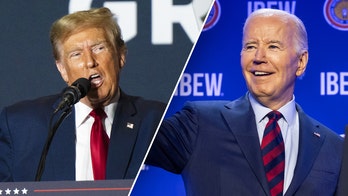
Among his many promises upon taking office, President Obama's goal of cutting the federal deficit in half by the end of his first term is perhaps his loftiest.
Yet with each spending proposal Obama rolls out, the deficit grows astronomically and the American people are growing more concerned.
The president's health care reform plan alone, without an agreement on how to pay for it, would pile on more than $1 trillion over the next decade to the already enormous 2009 deficit which is estimated at $1.8 trillion. But Obama is adamant that his plan must be "deficit neutral."
"Like energy, this is legislation that must and will be paid for. It will not add to our deficits over the next decade. We will find the money through savings and efficiencies within the health care system," he said on Tuesday.
Despite Obama making this pledge over and over again in past weeks, a series of recent polls indicate that Americans aren't convinced:
- A New York Times/CBS News poll shows 60 percent of Americans do not believe the president has a strategy to reduce the deficit.
- A Wall Street Journal/NBC poll says 58 percent of Americans want the president to make controlling the deficit a higher priority than a speedy economic recovery.
- A Pew Research Center poll indicates 55 percent of Americans are optimistic the president will eventually reduce the budget deficit, but that's a smaller number than the 61 percent of people who approve of him generally.
Obama said in a recent interview the deficit is something that keeps him up at night. "There's no doubt that we've got a serious problem in terms of our long-term deficit and debt. I make no apologies for having acted short-term to deal with our recession," he said, referring to the overhauling of the financial and auto industries.
His sleeplessness or concerns aren't unfounded; the numbers are staggering:
- $38 billion for the State Children's Health Insurance Program Reauthorization between 2010 and 2019
- $787 billion fiscal stimulus bill
- $75 billion homeowner stability program
- $125 billion "place holder" of additional financial stabilization funds (if needed)
- $22 billion for Cap and Trade program in 2020
So how will all these programs be paid for? The administration argues that a bulk of the savings will come from spending cuts on the war in Iraq, doing away with unnecessary and inefficient government programs, and taxing Americans who earn above $250,000. But raising taxes on Americans in that income bracket has skeptics scratching their heads.
"Raising taxes is the obvious answer. I think there's no question that we might want the rich to pay more in tax, but there isn't enough money among the rich to tax it all and really make a significant dent in the deficits that we're facing. That's just not going to work," said economist JD Foster of the Heritage Foundation.
"We're going to have to try something else, either raise taxes on the middle class because that's where the bulk of the money is. Or we're going to have to start getting serious about cutting spending."
William Gale from the Brookings Institution says the cause of the deficit is no mystery.
"We have an economic downturn, we've had massive financial intervention, massive stimulus, so the big deficits right now aren't that big a deal from a long term perspective," Gale told FOX News.
"At some point, we have to switch from fiscal stimulus to fiscal discipline," he said. "That's a very tricky balancing act. If we start imposing fiscal discipline too soon, cutting spending, raising taxes, we risk pushing the economy back down into a deeper hole."
But Foster isn't optimistic. "All the rhetoric and all the happy noises that can come out of Washington cannot disguise or replace the higher interest rates that we're going to be facing in this country with all this borrowing," he told FOX News.
"We may manage to muddle through for awhile but at some point the markets are going to insist on serious fiscal responsibility and Washington will not be able to talk its way out of that," he said.




